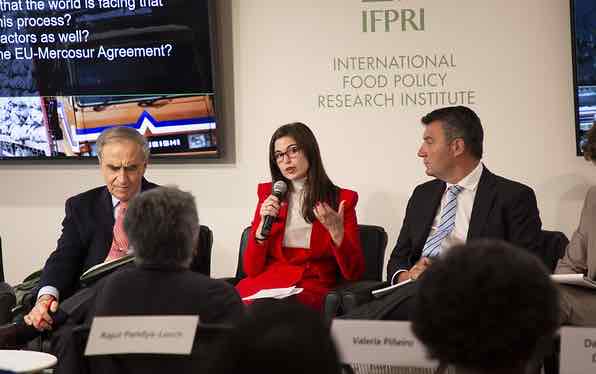In 2019, the European Union and the Mercosur trade bloc (Argentina, Brazil, Uruguay and Paraguay) reached a free trade deal in principle after 20 years of on-and-off negotiations. If ratified, it would be the largest such agreement for either group, creating a free trade zone of 774 million people and $21 trillion in GDP—almost a quarter of global GDP.
The EU-Mercosur deal thus has important implications for global agriculture, food systems, climate change, and meeting the SDGs. A Feb. 19 IFPRI policy seminar explored these challenges.
Conversations between the two blocs began in 1995 due to changes in the political landscape, including the “need for democratic governance and values, and to strengthen a rules-based international trade system,” said Eugenio Diaz-Bonilla, head of IFPRI’s Latin America and Caribbean Program.
Agriculture is an important sector in Mercosur in terms of GDP, employment, and exports. Key benefits of the agreement include a greater exchange of European industrial expertise and know-how and more competition from Europe, speakers said. This could encourage South America to modernize its industrial sector and stimulate growth; adapt agricultural production to better respond to changing consumer preferences, protect the environment, and accelerate the transition to renewable energy sources; and finally, to invest in science, technology, and research for maintaining food security and environmental goods.
The agreement’s “Trade and Sustainable Development” (TSD) chapter will be key in managing these issues. It includes provisions on climate change, the responsible management of supply chains, and creating a process to cooperate bilaterally, regionally and through multilateral forums.
TSD defines each country’s right to regulate and define its own priorities and policies on the environment and labor protection. However, “although there are differences in levels of development of each member, they cannot use these measures as a disguised restriction to trade,” said Institute for International Agricultural Negotiations (INAI) Foundation economist Sofia Perini.
The agreement still awaits ratification by both parties. “For the EU, the agreement requires ratification of the European parliament and European Council as well as approval of all member states. However, ratification on the Mercosur side needs to be carried out by all member states but does not need approval of all members to enter into force,” Perini said. This raises the possibility that some Mercosur countries might opt not to participate while others do. The agreement doesn’t address what would happen if any one Mercosur member bilaterally enters into force with the EU.
The agreement’s environmental impact is an important concern, particularly if greater trade and growth increase greenhouse gas emissions. “We are not going to reduce emissions by doing nothing—and we want a trade agreement that will create growth,” said IFPRI Senior Research Fellow David Laborde.
Better technology, in the form of alternative energy sources and improved fuel efficiency, can help tp address this problem, Laborde said. And while transporting more goods will produce greater emissions, the agreement also offers opportunities to exploit seasonal differences to more efficntly manage value chains.
Ramiro Costa, deputy executive director of the Buenos Aires Grain Exchange, described three new private sector initiatives in Argentina engaged in sustainable food production. The Global Agricultural Practice Network, created in 2014 in collaboration with the Buenos Aires exchange and other public and private institutions, promotes responsible farm-level agricultural practices with more than 90 organizations working together. Soybean traders in the country are working together to avoid deforestation via the online platform Agroideal (Ideal Agriculture), which helps them ascertain exactly where farmers plant their crops and if soybeans are coming from areas were environmental regulations prohibit farming as per Argentinian forest law. Finally, the Argentine Carbon Neutral Program, launched in Dec. 2019, focuses on minimizing the climate impacts of soybean value chains and beef production.
Both the EU and Mercosur have a number of concerns about TSD. Mercosur countries are concerned with their competitive disadvantages competing in European markets, and with the EU’s precautionary principle policy, which prevents the entrance of GMO products in its market. The EU, meanwhle, is concerned with Mercosur’s effective implementation of the Paris agreement, compliance with health and environmental standards, and impact of agricultural products from Mercosur for sensitive EU industries and farmers. “Both parties are concerned with the agreement’s dispute settlement mechanism and its role in encouraging sustainability commitments,” Perini said.
For the first time, sustainable development is a part of a Mercosur trade agreement. Thus, the deal could serve as a platform for implementing international agreements, and as a transparency mechanism—helping to lay the foundation for future trade agreements and harmonizing regulations within Mercosur. “While it’s a challenge for both parties to avoid its usage for growing protectionism,” Perini said, “TSD could show the world how to produce sustainably.”
Swati Malhotra is a Communications Specialist with IFPRI’s Markets, Trade, and Institutions Division.







